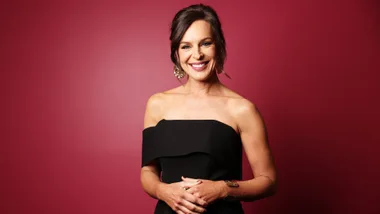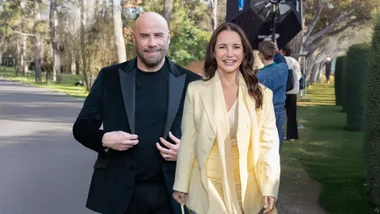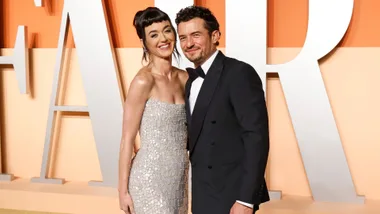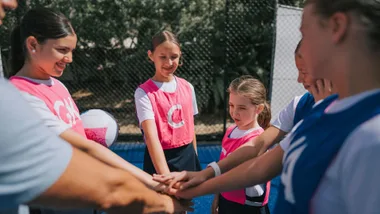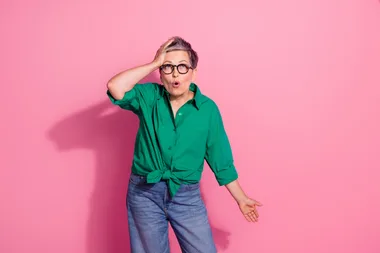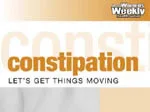This taut, terrific thriller was selected as the Great Read in the March issue of The Australian Women’s Weekly. It is a debut novel by university lecturer Jane Goodall, who lives in Sydney. Jane was born in the UK, but has spent most of her life in Australia. It was fifteen minutes walk from school to the station, or a bit more if you were carrying a heavy bag. Nell was carrying two bags: one with the week’s clothing and her growing collection of cosmetics, and the other with the weekend’s homework. The homework bag was heaviest. She changed the bags from hand to hand, to share out the drag on her arms, and every twenty paces (she counted them) she stopped to rest briefly and blow on the whitening palms of her hands.
This was going to be a heavy year. Some of her teachers said ten O levels was too much, but Nell thought ten sounded like a nice number. Mum told her to take eight and Dad said you only needed five to get into the navy, but they weren’t here – so there. Aunty Pat said ten sounded impressive. The twins had five each and she was very proud of them.
Nell had to be a weekly boarder this year and spend the weekends at Aunty Pat’s, which was all right really because she liked being with the twins and anyway she was used to it because Dad was always being posted somewhere overseas and sometimes Mum went with him. The twins were Rita and Julie, and when she got home they were all going out to the cinema together in Exeter to see Doctor Zhivago.
‘Julie’s seen it twice already,’ Rita said on the phone. ‘She’s got a crush on Omar Sharif. You’ll fall for Tom Courtenay, I know. He’s the intellectual type.’ Nell quite liked her cousins thinking she’d go for the intellectual type. She put the bags down again and flexed her hands. The new maths book was the worst thing to carry, even between classes. It was big and old and a bit smelly with a thick hard cover and an ink stain on the edge of the pages in one corner. Nell thought at least six people must have used it before. She didn’t like used books, with dirty pages and other people’s underlinings all over them. The biology book was almost new. It had glossy pages with photos of frogs pinned out for anatomy. She had a new French dictionary and an old French grammar. The English texts were old, too, but she was going to buy her own copies of those: The Mayor of Casterbridge and Book 6 of The Prelude were the ones Miss Crabbe announced they would be doing this term and she said that all the girls should try to have them.
Miss Crabbe was called Crabby, but she wasn’t. She even smiled when they said it. ‘Hey, Crabby, are there any good sex scenes in this book?’ She was a lot younger than the other teachers and looked a lot happier. She had a Sandie Shaw haircut and wore purple tights and in summer term she wore a Mary Quant dress. This term she came to school in a trouser suit. The girls crowded round her after assembly. ‘You could be a model,’ they said.
It took Nell twenty minutes to get to the station and that left only ten minutes to wait for the Exeter train. Or buses. But she specially hated waiting for the Friday train at the end of the day, when it was getting all gloomy. She positioned her bags near the edge of the platform, and brushed the front of her school mac with her hands. It had been dry-cleaned for the new term but still looked faded and limp, and it flapped around in the wind. Nell wished she had a trouser suit like Crabby, with a big fold-back collar and two rows of buttons. In her school bag was a copy of Honey magazine with all the autumn clothes in it. She’d bought it after school on Wednesday – the day it came out – but had saved it for reading on the train.
There weren’t many people waiting on the platform – fewer than usual for the 5.10. Some of the trains had corridors but the 5.10 from Penzance often didn’t. It just had separate compartments with a door at each side of the carriage, so once you were in, you were in. Nell knew better than to get into a compartment where she’d be on her own, so she usually tried to pick out someone on the platform who’d be safe to travel with. Some other girls if possible, or, failing that, any woman would do, really. That’s what her mother advised her. But the only other people waiting today were a man with an umbrella, who would probably go first class, and a couple of boys from the high school. A lot of Nell’s friends would have got in with the boys. They didn’t look exactly dangerous, but Nell didn’t want anyone thinking she was ‘boy mad,’ least of all the boys themselves. It was always better to play hard to get, Rita and Julie told her.
When the train drew in, a student in a green duffle coat got out and held the door for Nell, his long hair blowing across his face. She checked quickly inside. There was a dumpy, middle-aged woman in the corner opposite who seemed to be asleep, and that was good because Nell didn’t want to get drawn into aimless chat. She shut the door, put her bags on the seat and pulled the window up a bit. The man in the duffle coat had pushed it right down, so it must have been freezing with all the cold air rushing through. She arranged her bags on the seat beside her and got out her magazine.
The autumn fashion colours were amazing. Twiggy was wearing a dress in rich chocolate corduroy with mustard tights and a rust coloured blouse from Biba in some shiny material that draped into big gathered sleeves. Over the page was the perfect trouser suit: deep burnt orange with a blue pin-stripe. The jacket was long – ‘military length,’ said the description – and had a lovely curved shape, fitted close around the ribs, then floated out to the hem. The trousers were flared too, and the model wore high heeled boots under them. Jean Muir trouser suit, fourteen pounds fifty. Nell could not afford more than twelve pounds even if she saved up most of her dress allowance for the term. Perhaps when she went to university in a few years time she’d be able to buy a trouser suit from her student grant and throw away her old school mac, which was smelling horribly of dry-cleaning fluid.
She kept turning pages, then stopped to read an article about Lynn Redgrave. It said that Lynn had always been the ugly duckling in her glamorous family, because she was plump and self-conscious while her sister Vanessa was being called ‘the most beautiful actress in England,’ but now everybody was raving about Lynn in Georgy Girl and saying that she could be the most talented of all the Redgraves. Nell lost interest in the article. She hadn’t seen Georgy Girl and, besides, her eyes were stinging. Maybe from too much reading.
Her gaze slid across to the window. The dark was closing in outside and the lights in the carriage were reflecting on the glass, so she had to put her face right up to it to see. The bushes were black shadows along the railway line, with an eerie glow around them because the sky was still letting through shafts of light that showed the high points of the moors further away. If this was Dartmoor, they must already have passed Ivybridge, but the train wouldn’t stop till Torquay. The glass was cold against Nell’s forehead and the rattling of the train made her teeth vibrate. She drew back and saw the compartment reflected, with the hills and tress rushing through it like ghosts.
The train went over some points and jolted from side to side so Nell’s magazine nearly slipped from under her hand. She caught it as it was about to fall, and that was when she noticed something running along the floor of the carriage. At first she thought it was a trickle of water, but it was thick and dark, and then another streaked across after it, and another, and another. Nell lifted her feet off the floor in a sudden reflex, as she recognised that the liquid was dark red and spreading everywhere.
Although she hardly realised it, she was already screaming as she looked at the woman opposite and saw the bib of red stuff soaking into the sheepskin collar, gathering in the woollen lap and seeping steadily through onto the floor. Nell threw down the window and screamed for help out into the night, fighting for breath against the great thumping beats of her own heart. It was a full two minutes before it occurred to her to pull the emergency cord.






